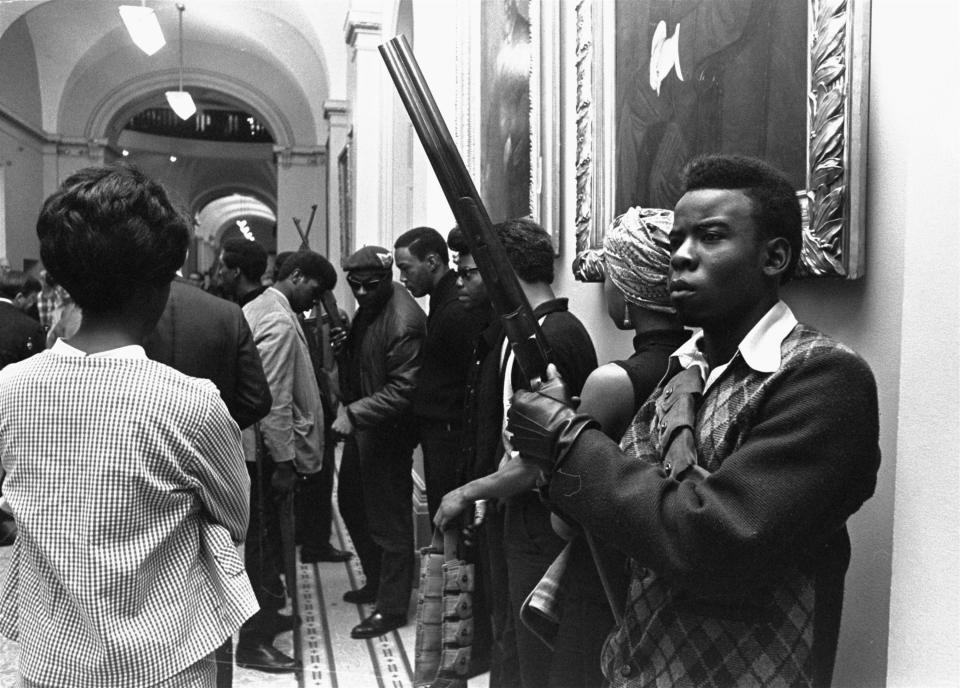Mass shootings are a call to arms for some black Americans, not a moment for gun control
Black Americans have had a curious relationship with firearms. These weapons were used to keep them subdued during slavery, then terrorized in the Jim Crow south. African-American gun advocates argue that guns also preserved our ancestors’ peace when they were menaced by racists in the antebellum South and the divided North. They argue that, as with all social issues in America, the role of race cannot be downplayed in gun control debates.
I am an adamant proponent of what I believe to be sensible gun reform. But I also recognize that America’s firearm fetish won’t be addressed by folks like me having conversations in a vacuum. So I reached out to Kofi Kenyatta, a gun rights advocate I deeply respect, to get his take on how the issue affects America in general and the black community specifically.
Should blacks reject gun restrictions?
Kenyatta, co-founder of Detroit’s Black Bottom Gun Club, points to the growing emergence of violent white supremacist sects and the persistence of structural racism as reasons to reject calls for gun restrictions.
Kenyatta believes that gun control measures are often a response to black Americans' attempts to exercise their Second Amendment rights. He points to Michigan's adoption of gun ownership restrictions after Ossian Sweet, a black physician who bought a house in a heretofore white Detroit neighborhood in 1925, used a shotgun to protect his family against an angry white mob. Sweet was eventually acquitted of murder charges, but in 1927 the state lawmakers adopted legislation giving counties control over the issuance of gun permits, a move designed to limit black gun ownership.
Perhaps most famously, on May 2, 1967, 30 or so fierce-looking members of the Black Panther Party for Self-Defense clad in leather coats entered the California Capitol toting loaded pistols and long guns.

The Panthers were protesting proposed legislation they believed was targeting black militants’ right to use guns to protect themselves against an oppressive police force and hostile racists. They declared loudly that their right to carry the weapons was enshrined in the Second Amendment.
Gun control's 'racist past and present'
The demonstration scared the bejeezus out of California legislators, who responded with the Mulford Act, which prohibited the open carry of firearms in America’s most populous state. The act was adopted with the endorsement of an unlikely ally: the National Rifle Association.
“Gun control has a racist past and present,” says Kenyatta, 33, son of the late Detroit Councilman Kwame Kenyatta. "What that means to me is that we have to pay attention to race when we’re analyzing the problem, looking for solutions and defining what success looks like.”
Kenyatta believes that instead of focusing on taking away guns, lawmakers should be addressing the root causes of gun violence in the inner city: racism, poverty, a lack of resources and opportunity.
Dayton shooting: Evil lives in America. We need gun control, but it won't fix hate.
“As Americans, we tend to look at the surface," he says. "What is the low-hanging fruit? What is the easiest thing to do? Let’s take away the guns and lock people up. … Instead of getting to the root cause.”

Kenyatta, who resigned his NRA membership over its demonization of the Black Lives Matter movement, disagrees with 59% of Americans who said they support a ban on assault weapons in a recent HuffPost poll. He points out that out that many mass shootings have been committed by white men with connections to white nationalism, and he believes that if he gives up his weapons, he may be making himself vulnerable to racists who will be unlikely to surrender their firearms.
Guns as the go-to substitute
“I know that there are people who don’t like me just for the color of my skin who are heavily armed, and I can’t in good conscience relinquish my ability to defend myself, my family and my community knowing that law enforcement and even the government doesn’t have the capability and often times isn’t willing to protect my community,” Kenyatta says.
He adds, “It’s incumbent upon especially black men to be armed for means of self-defense. Being in tune with the national rhetoric and being conscious of our history and our present here, I see nothing wrong with being able to match fire with fire with those who have historically attacked our community with physical violence and social-economic violence as well.”
El Paso shooting: 'Open season' on Hispanics in America thanks to 'racist in chief' Trump
Some will find Kenyatta’s take on guns alarming, even paranoiac. But all Americans should think about the very real historic and present-day conditions that he describes to build his case.
While I think Kenyatta makes compelling arguments, I continue to support gun reforms like background checks and assault weapons bans. But it’s hard to argue with his assessment that in the absence of actual problem solving, like legitimate poverty reduction plans and law enforcement that treats white nationalism with the same urgency as other forms of domestic terrorism, guns will continue to be America’s go-to substitute.
Kim Trent, a member of the Wayne State University Board of Governors, is a contributor to the Detroit Free Press, where this column first appeared.
You can read diverse opinions from our Board of Contributors and other writers on the Opinion front page, on Twitter @usatodayopinion and in our daily Opinion newsletter. To respond to a column, submit a comment to letters@usatoday.com.
This article originally appeared on Detroit Free Press: For some blacks, mass shootings are a call to arms, not gun control

